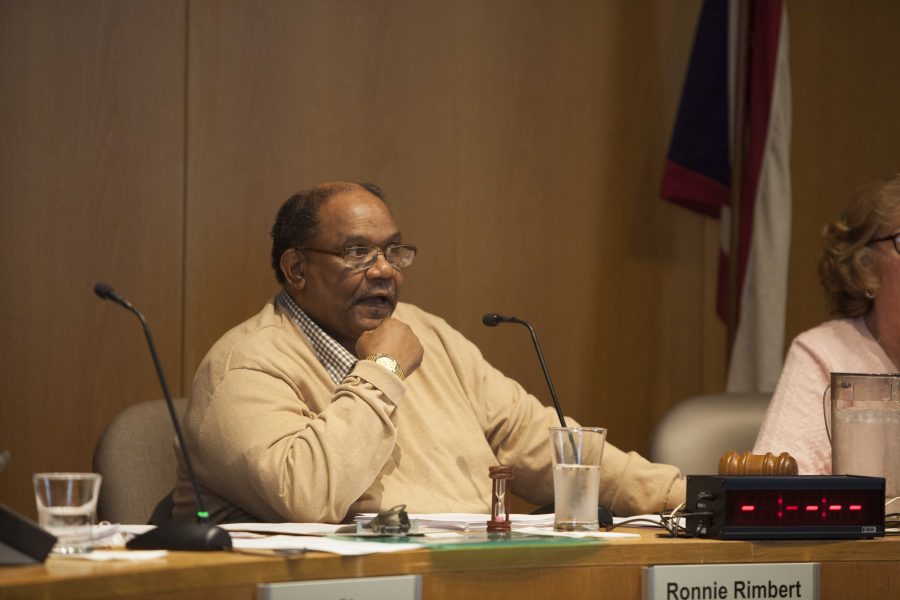City Resists State’s Income-Tax Collection
Photo by Bryan Rubin, Photo editor
City Council President Ronnie Rimbert speaks at Monday’s City Council meeting. Council passed a resolution opposing Governor John Kasich’s proposed 2017– 2018 budget, which proposes centralized collection of business income tax returns.
April 7, 2017
City officials are staunchly resisting a recent proposal by Ohio Governor John Kasich that would give the state centralized control of each city’s business income tax. Local officials fear the program is a stepping-stone to state regulation of local matters, leading Oberlin City Council to pass a resolution in opposition to the proposed program at Monday’s meeting.
The city receives $7.5 million in income taxes each year, but only about $250,000 comes from business income tax. The tax money goes into the General Fund and Income Tax Capital Fund. Income tax makes up about 58 percent of the total General Fund. The General Fund goes toward public works, police and parks, while the Income Tax Capital Fund helps with things like street repair, vehicle replacement and sewer work.
Oberlin City Councilmember Sharon Pearson views the plan as just another step toward more state control of the cities.
“The plan is eroding away local rights and hurting our residents, because that means we are going to have to make up that money somewhere else,” Pearson said.
Councilmember Bryan Burgess is similarly wary of the state’s increasing effort to supersede local government.
“This is our community,” Burgess said. “Who are they to tell us how to run our town? It bothers me.”
The recent resolution by City Council states that they strongly oppose the proposal, specifically because the proposal would “hamper municipalities’ ability to audit and correct municipal income tax business returns and to equitably enforce the municipal income-tax laws, as they have been crafted as a vehicle to control the administrative process of municipal income tax to the benefit of specific taxpayer interests.”
According to Burgess, the city has lost more than $1 million each year due to state involvement in city finances but was unsure this proposal would cause a net loss in city revenue since there is fluctuation based on Oberlin’s net profits tax.
City Finance Director Sal Talarico worries that this could be just the beginning of larger state plans to take centralized control of city finances and operations.
“The first step was when they forced municipalities to standardize tax revenues,” Talarico said. “They said if you don’t, you won’t be authorized to collect tax. Talk about putting a gun to your head. So, we did it. Now they are taking the second step.”
Communications Director for the Ohio Department of Taxation Gary Gudmundson pointed out that the proposal is only for the collection of income tax from city businesses, which makes up a small portion of the overall income tax revenue.
“The plan is a centralization of the collection of the municipal income tax on business net profits,” Gudmundson said. “It is the smallest percentage of bill collection. The largest percentage comes from employer withholding and individual municipal income tax fundings. Municipalities would hold on to those aspects of the municipal income tax.”
The tax proposal, if passed, would go into effect in the 2018 fiscal year. Gudmundson argued the tax reform would help the economy and support advertising to out-of-state visitors.
“It would make the economic and business climate in Ohio greatly improved,” Gudmundson said. “We would have a better chance at attracting business to the state and making in-state business more profitable. It’s a no-brainer.”
Gudmundson estimated the proposal would save Ohio municipalities $9 million per year by more efficiently processing tax returns, and believes that the centralized plan will benefit Ohio taxpayers, pointing to criticism of Ohio’s current local income tax system, which allows each city to design its tax laws.
“The national Tax Foundation has called Ohio’s municipal income tax the worst local tax system in the country,” Gudmundson said. “They all have their own rules, their own requirements. It’s completely fragmented and a huge burden on business taxpayers in Ohio.”
However, Talarico believes there shouldn’t be such a reinforcement of power at the state level.
“Over time the state is concerned with collecting more dollars for the state,” he said. “They receive a percentage of collections for this privilege. If they charge municipalities for federal income-tax collections, that’s more money for the state government. Frankly, we need less state government. We know how to spend the money so that the people of Oberlin see it. We are experts at that. In local government, you can see where your dollars are going. In federal you see it, but not as much, and in state government, even less.”
























